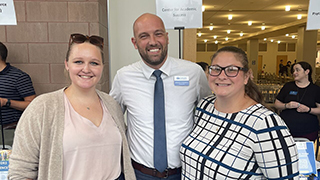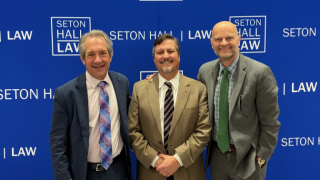Gaining Control Over Addictive Technologies - Seton Hall University
Friday, April 21, 2023

In writing the book, Professor Bernstein addresses a phenomenon that has only become more pronounced since the pandemic—overuse of technology. As Cambridge University Press describes the work:
Our society has a technology problem. Many want to disconnect from screens but can't help themselves. These days we spend more time online than ever. Some turn to self-help-measures to limit their usage, yet repeatedly fail, while parents feel particularly powerless to help their children. Unwired: Gaining Control over Addictive Technologies shows us a way out. Rather than blaming users, the book shatters the illusion that we autonomously choose how to spend our time online. It shifts the moral responsibility and accountability for solutions to corporations. Drawing lessons from the tobacco and food industries, the book demonstrates why government regulation is necessary to curb technology addiction. It describes a grassroots movement already in action across courts and legislative halls. Groundbreaking and urgent, Unwired provides a blueprint to develop this movement for change, to one that will allow us to finally gain control.
Gaia Bernstein is the Technology, Privacy and Policy Professor of Law, Co-Director of the Institute for Privacy Protection, and Co-Director of the Gibbons Institute of Law Science and Technology at Seton Hall Law. She specializes in law and technology, information privacy, health privacy, intellectual property, law and genetics, and reproductive technologies. Her scholarship examines users' interactions with new technologies across diverse legal fields. Bernstein is the founding director of the Institute for Privacy Protection. She created and spearheaded the Institute’s nationally recognized Outreach Program, which educated parents and students about technology overuse and privacy.
We are fortunate that Professor Bernstein found time to provide additional insight into her work by answering a few questions:
What inspired you to write the book?
My scholarship always focused on the way people use technology and what role law could or should play. Specifically, sometime around 2015 I noticed how my life changed. I found myself constantly looking at screens, wherever I was, whether on the PATH train riding to school or standing in line in a coffee shop. I also have three children and I noticed how life around them was changing. Young kids who used to play with each other, now sat at birthday parties staring at their phones.
What can the law do to curb technology overuse?
One way is through exerting pressure on technology companies to re-design their products to make them less addictive. It can be done directly, for example, through class action or legislation. But also indirectly through antitrust to create competition to produce business models that will replace the prevailing advertising business model, which uses our time as a resource. A second way is through changing how we design and use spaces, for example, how we use technology in the classroom.
Do you think that very recent developments in generative AI could worsen the problems that you highlight?
Yes, AI would make our designs more addictive; it is already doing so. But I believe that ChatGPT and similar AI systems have made such leaps that they finally forced us to pay attention. Take technology in the K-12 classroom. The policy for years has been maximizing technology in the classroom. We have ample evidence this has not improved learning outcomes and that excessive screen time is harmful to children. ChatGPT finally made people realize that we need to stop mindlessly incorporating technology into the classroom. [For more on this topic see Prof. Bernstein’s Time Magazine Idea piece]
How did your experience as a professor at Seton Hall Law shape the book?
In my role as the director of the Institute for Privacy Protection at the Law School, I got an opportunity to develop my initial ideas for the book. In 2017, we launched a school outreach program for school-aged children and their parents. Seton hall law students taught kids who just got their first cell phones and I spoke to parents. I started out believing that bringing awareness and exercising self-help would help solve the problem. But within two years sensing the despair and powerlessness among the parents I spoke to; I realized that I would write a different book. I ended up writing a book that emphasizes the need to shift from internal and home battles to collective action in the public sphere to apply pressure on technology companies to re-design their addictive products.
Do you think your work on this book will shape the courses you teach or how you teach them?
I have started teaching a seminar about law and the technologies of life, which focuses on addictive technologies as well as artificial intelligence. I expect to expand on these topics in next year’s seminar. I never believed in banning laptops in the classroom, but I am considering asking the students to turn the wi-fi off on their computer during class. Though my hope is that eventually the norm will be for institutions, whether higher education or schools, to re-evaluate the role of open wi-fi in the classroom.
To learn more about Unwired: Gaining Control over Addictive Technologies visit Professor Bernstein’s Unwired blog and personal website, The Tech Policy podcast, Keen On with Andrew Keen podcast and Larry Solum on Legal Theory Blog.
Categories: Law






